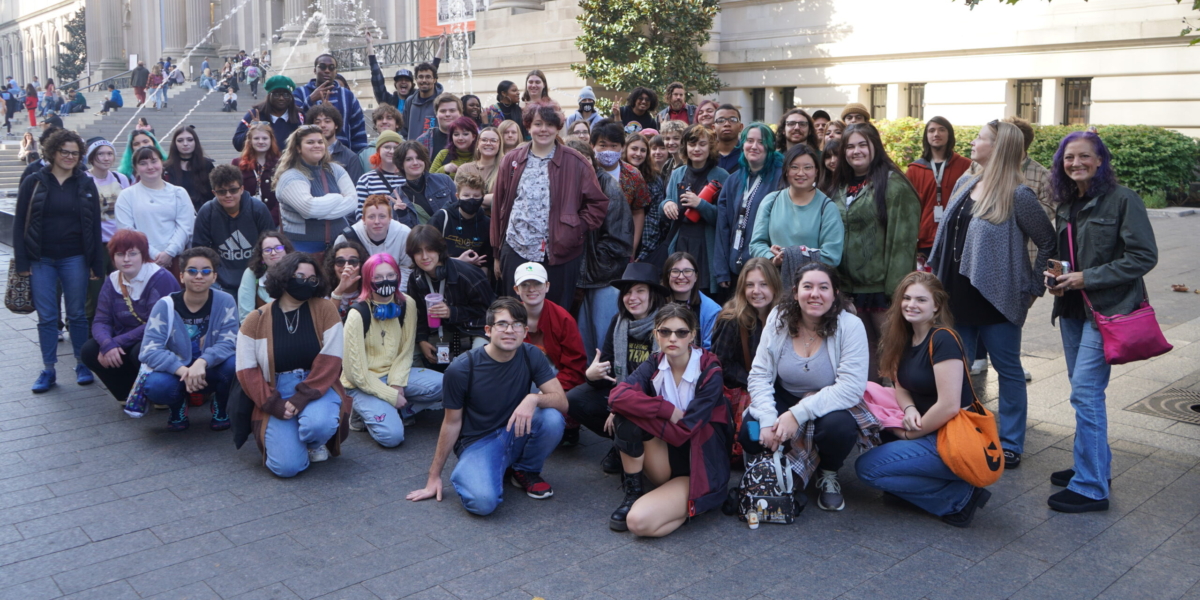
A look inside PCA&D’s unique Foundation year
Tuesday, August 6th, 2024
So much has changed institutionally since Pennsylvania School of the Arts (PSA) became Pennsylvania College of Art & Design. The student body has expanded; the number of majors and course options has exploded; and the College has embedded itself as a crucial member of the arts community in the region and beyond.
But one thing hasn’t changed: The importance of a first-year Foundation experience. It remains a PCA&D student’s introduction to the art and design college environment, and solidifies a PCA&D student’s knowledge of a wide range of creative options. Whether they know what their major will be or are still searching, every student who enters PCA&D for four years of study will spend that first year exploring as a Foundation student.
“The foundation program,” reads a PSA brochure from the 1980s, “is the springboard for further concentrated studies in the specialized upperclass programs. The purpose of the foundation program is to impart the basic knowledge of visual communication theory and practice, and to develop the skills necessary to achieve fluency in any field of visual art.”
Decades later, it still holds true.
Why is it important? What does a Foundation student gain from that exploration?
Think of the four-year experience as a scaffold, with the senior thesis project being the capstone that works to bring together everything that’s been learned into a year-long project.
Without a firm basis in developing and bringing ideas to fruition, in professionalism, in time-management and art and design concepts, in critique and deadlines and critical thinking, that scaffolding won’t have a firm basis to be built upon.
And that is where PCA&D’s Foundation year excels.
Building a professional practice
Or, think of it like a jump-start.
“The Foundation department stresses foundational skills that students need to succeed in their college and future careers,” says William Mammarella, Assistant Professor and Foundation Department Chair. “The Foundation department views these skills as the basis of professional practices that students will carry into their major where they will learn more specific and advanced skills.”
“Ideation and concept development are emphasized in every Foundation class alongside technical and craft-building exercises because creatives need to be adaptable and innovative in order to thrive. Every Foundation class includes assignments where students need to generate and learn techniques and concepts that are invaluable skills needed for upper-level Photography & Video classes,” says Eric Weeks, Photography & Video Department Chair. “Techniques such as camera operation and file manipulation in Adobe software are first addressed in these Foundation courses.
Conceptual thinking skills that ask the student what they are intending to communicate with their images are also important skills first learned in the Foundation year, later to be honed, refined, and mastered in upper-level classes.”
Fine Art Department Chair Becky Blosser agrees, saying that the Foundation year is “a mix of problem-solving, experimentation, research, and critique that propels a fine art student’s work during their senior year. At this point, students are developing their thesis work and are adapting the skills learned during Foundation year to their specific interests. Utilizing productive critiquing methods is an essential component of this. Critique gives space for student to articulate their ideas, to understand how their work is perceived, it builds community, and helps with decision-making as students navigate the vast array of choices while developing their creative work.”
Once that foundation is in place, students are in a much stronger position to carry through their own creative process, and to pursue whatever major they choose.
Says Blosser, “The skills learned during Foundation year help to prepare students for the independently directed workload experienced during their senior year.”and develop ideas. Then, those ideas are brought to life through the craft taught in that specific class.
Those skills all need to be developed whether or not a student knows what their ultimate major will be. And, no matter the major, the professional practices and Liberal Arts skills they gain will be put into practice.
